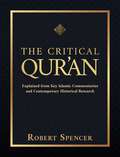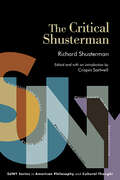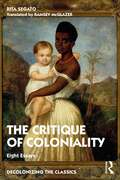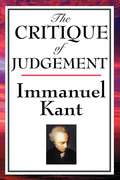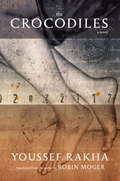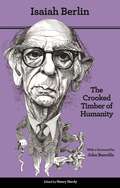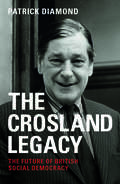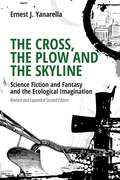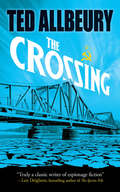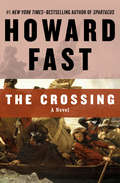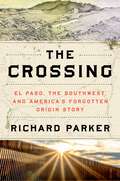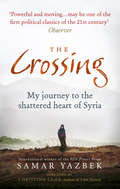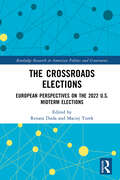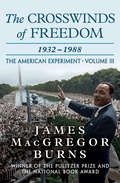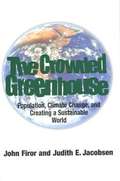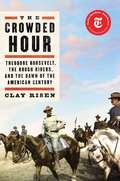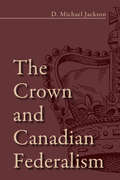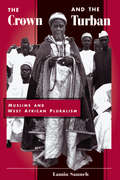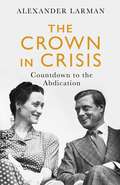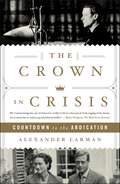- Table View
- List View
The Critical Qur'an: Explained from Key Islamic Commentaries and Contemporary Historical Research
by Robert SpencerA unique resource for understanding the Islamic Holy Book.As Islamic terrorism becomes a distressingly common feature of life in North America and Europe, it has become increasingly important for non-Muslims to be aware of the ideology that animates and motivates jihad violence and Sharia oppression of women and others—an ideology that&’s rooted in Islam&’s holy book, the Qur&’an. English-speaking people, however, have found attempts to understand the Qur&’an and Islam impeded by unclear, densely worded translations and explanatory notes written by Islamic apologists attempting to conceal, rather than reveal, how Islamic jihadis use the texts and teachings of the Qur&’an to justify violence and supremacism, and to make recruits of peaceful Muslims. The Critical Qur&’an, in contrast, makes clear the passages that are used to incite violence. Historian and Islamic scholar Robert Spencer elucidates the Qur&’anic text with extensive references to the principal tafsir, or commentaries, that mainstream Muslims use today to understand the Qur&’an, showing how interpretations that sanction violence are unfortunately not outliers, but central in Islamic theology. The Critical Qur&’an is the Islamic counterpart to numerous critical and skeptical editions of the Bible that have appeared over the last century and more. It is the one edition of Islam&’s book that doesn&’t shy away from elucidating why the holy book of Islam is so frequently quoted and referred to with reverence by people who commit and/or justify acts of violence. It is a basic resource for everyone who wishes to understand the persistent phenomenon of Islamic terrorism, and the peculiar provenance of this most provocative book.
The Critical Shusterman (SUNY series in American Philosophy and Cultural Thought)
by Richard ShustermanCollecting sixteen key texts on a broad range of key philosophical topics enables readers to perceive the scope of Shusterman's philosophy and appreciate its systematic aspects.Richard Shusterman is one of today's foremost philosophers. His influential and widely translated work is distinctive for its originality and its integration of multiple philosophical perspectives (analytic philosophy, phenomenology, hermeneutics, critical theory, and East Asian thought) to create a new transcultural pragmatist vision. Although most famous for his groundbreaking writings in aesthetics, somatic philosophy, and philosophy as an art of living, these texts are integrally connected with Shusterman's vital views on ontology, epistemology, and philosophy of mind, ethics, and politics. Collecting sixteen key texts on this broad range of topics, The Critical Shusterman enables readers to perceive the scope of Shusterman's philosophy and appreciate its systematic aspects. Editor Crispin Sartwell's superb introduction highlights those aspects in assessing Shusterman's thought in the context of contemporary philosophy while suggesting ways that Shusterman's project could be developed in the future.
The Critique of Coloniality: Eight Essays (Decolonizing the Classics)
by Rita SegatoThis translation of Rita Segato’s seminal book La crítica de la colonialidad en ocho ensayos offers an anthropological and critical perspective on the coloniality of power as theorized by the Peruvian thinker Aníbal Quijano. Segato begins with an overview of Quijano’s conceptual framework, emphasizing the power and richness of his theory and its relevance to a range of fields. Each of the seven subsequent chapters presents a scenario in which a persistent colonial structure or form of subjectivity can be identified. These essays address urgent issues of gender, sexuality, race and racism, and indigenous forms of life. They set the decolonial perspective to work, and are connected by two central preoccupations: the critical analysis of coloniality and the effort to reimagine anthropology as "responsive anthropology," a practice at once answerable and useful to the communities previously regarded as the "objects" of ethnographic thought. The Critique of the Coloniality makes important and original contributions to our understanding of colonial and decolonial processes, drawing on the author’s experience of feminist and antiracist movements and struggles for indigenous and human rights. This book will appeal to students and scholars working in anthropology, Latin American studies, political theory, feminist and gender studies, indigenous studies, and anticolonial, post-colonial, and decolonial thought.
The Critique of Judgment
by Immanuel Kant James Creed MeredithThis 1790 polemic by one of philosophy's most important and influential figures attempts to establish the principles that support the faculty of judgment. Kant's third critique -- after Critique of Practical Reason and Critique of Pure Reason -- remains one of the most important works on human reason. The Critique of Judgment informs the very basis of modern aesthetics by establishing the almost universally accepted framework for debate of aesthetic issues.<P><P> As in his previous critiques, Kant seeks to establish a priori principles. The first part of this work addresses aesthetic sensibility. The human response to specific natural phenomena as beautiful, he asserts, is a recognition of nature's harmonious order that corresponds to a mental need for order. The critique's second half focuses on the apparent teleology in nature's design of organisms. The philosopher declares that the mind is predisposed to find purpose and order in nature, and this predisposition forms the main principle underlying all our judgments. Although this could be interpreted as an argument in favor of a creator, Kant insists that a supernatural dimension or the existence of God cannot be proven -- such considerations lie beyond the realm of reason, solely within the province of faith.
The Crittendon Files Trilogy
by Creston Mapes#1 FEAR HAS A NAME: It was more than a break-in. More than a stalking. It was personal. When a stalker targets his family, journalist Jack Crittendon must uncover who the person is and what his motives are--if he is to protect the ones he loves. It will lead Crittendon into a world of behind-closed-door secrets and faith gone awry, as does his investigation of a missing pastor, whose apparent suicide is more than it appears. Each move Crittendon makes weaves him tighter and tighter into a web of lies, greed, hypocrisy, sin, and danger. He believed he'd never give in to fear. But that was before. And holding on to his faith won't be easy. Nor will keeping his family safe, and ending the terror. Because that might require him to step over lines he never dared to cross.#2 POISON TOWN: People are sick and dying. Rumors are swirling. Some claim chemicals leaking from a manufacturing plant are causing the cancer that's crippling people on the poor side of Trenton City, Ohio. Yet nothing at the plant appears amiss. The problem remains a mystery until reporter Jack Crittendon's long-time mechanic falls ill and he investigates. Soon Jack becomes engulfed in a smokescreen of lies, setups, greed, and scandal. The deeper he digs, the more toxic the corruption he uncovers. As he faces off with the big-time players behind the scenes and tries to beat the clock before more people die, he realizes the chillingly unthinkable--he knows too much.#3 SKY ZONE: Jack and Pamela Crittendon have hit the breaking point. After months out of work as a reporter, Jack is playing Mr. Mom and working part-time at Festival Arena with his survivalist friend Brian Shakespeare. Meanwhile, Pamela has gone back to work full-time while eight months pregnant. Having her recently widowed mother on hand isn't making matters any easier. With financial pressures boiling, Jack reports for duty at a rally for controversial presidential candidate Martin Sterling where he expects a mindless night on the job. But when Homeland Security picks up intel about a potential terrorist threat, Jack and Shakespeare are thrust into a life-or-death battle to save their own lives--and the lives of thousands of innocent people.
The Crocodiles
by Robin Moger Youssef RakhaSet in Cairo between 1997 and 2011, The Crocodiles is narrated in numbered, prose poem-like paragraphs, set against the backdrop of a burning Tahrir Square, by a man looking back on the magical and explosive period of his life when he and two friends started a secret poetry club amid a time of drugs, messy love affairs, violent sex, clumsy but determined intellectual bravado, and retranslations of the Beat poets. Youssef Rakha's provocative, brutally intelligent novel of growth and change begins with a suicide and ends with a doomed revolution, forcefully capturing thirty years in the life of a living, breathing, daring, burning, and culturally incestuous Cairo. From the Trade Paperback edition.
The Crooked Timber of Humanity: Chapters in the History of Ideas - Second Edition
by Isaiah Berlin"Out of the crooked timber of humanity, no straight thing was ever made."--Immanuel Kant Isaiah Berlin was one of the most important philosophers of the twentieth century--an activist of the intellect who marshaled vast erudition and eloquence in defense of the endangered values of individual liberty and moral and political plurality. In The Crooked Timber of Humanity he exposes the links between the ideas of the past and the social and political cataclysms of our own time: between the Platonic belief in absolute truth and the lure of authoritarianism; between the eighteenth-century reactionary ideologue Joseph de Maistre and twentieth-century Fascism; between the romanticism of Schiller and Byron and the militant--and sometimes genocidal--nationalism that convulses the modern world. This new edition features a revised text that supplants all previous versions, a new foreword in which award-winning novelist John Banville discusses Berlin's life and ideas, particularly his defense of pluralism, and a substantial new appendix that provides rich context, including letters by Berlin and previously uncollected writings, most notably his virtuoso review of Bertrand Russell's A History of Western Philosophy.
The Crosland Legacy: The Future of British Social Democracy
by Patrick DiamondAnthony Crosland bequeathed a significant intellectual legacy to the Labour Party including his celebrated treatise The Future of Socialism published sixty years ago. In this timely book, Patrick Diamond argues that Crosland continues to serve as a vital reference point for today’s Labour Party. He considers a wide range of Crosland’s writings on the economy and politics, relating his ideas to ideological debates taking place within the Labour Party about egalitarian social democracy, electoral strategy, the European question, and the importance of progressive liberalism on the British centre-left. This is the first substantial work to fully consider Crosland’s legacy for British social democracy. Written in a clear and persuasive way, it will appeal to a broad audience of thinkers and activists with an interest in the history of the Labour Party and the British Left.
The Cross of War
by Matthew Mccullough"The Cross of War" documents the rise of "messianic interventionism"-the belief that America can and should intervene altruistically on behalf of other nations. This stance was first embraced in the Spanish-American War of 1898, a war that marked the dramatic emergence of the United States as an active world power and set the stage for the foreign policy of the next one hundred years. Responding to the circumstances of this war, an array of Christian leaders carefully articulated and defended the notion that America was responsible under God to extend freedom around the world-by force, if necessary. Drawing from a wide range of sermons and religious periodicals across regional and denominational lines, Matthew McCullough describes the ways that many American Christians came to celebrate military intervention as a messianic sacrifice, to trace the hand of God in a victory more painless and complete than anyone had imagined, and to justify the shift in American foreign policy as a divine calling.
The Cross, the Plow and the Skyline: Science Fiction and Fantasy and the Ecological Imagination (Revised and Expanded 2nd Edition)
by Ernest J. YanarellaThe apocalyptic, pastoral, and urban traditions have fundamentally shaped Western history and influenced American religion, culture, and politics. This book argues that these traditions have not only been decisive in giving form and substance to classic a
The Crossing
by Ted Allbeury"[Allbeury] tells it as it is: he was there and he knows what it feels like."—The Washington PostInspired by the Soviet Union's downing of an American spy plane flown by Francis Gary Powers in 1960, one of Ted Allbeury's most explosive thrillers introduces the brilliant British spycatcher Joe Shapiro. But even Shapiro's superiors doubt his intentions when he attempts to convince the CIA to exchange a high-powered Communist agent for the seemingly unimportant pilot. Does Shapiro have more than a professional interest in the case? An intricate web of lies and deception brings the Cold War to vivid life in this intriguing work by the bestselling "master of the genre" (Booklist).
The Crossing: A Novel
by Howard FastA novel about George Washington&’s trip across the Delaware River and the Battle of Trenton by the #1 New York Times–bestselling author of Spartacus. Immortalized on canvas by Emanuel Leutze, Washington&’s journey across the Delaware River is one of the most celebrated moments in American history. But the true story of the crossing, and of what came after, is often lost in the legend. In The Crossing, Howard Fast, author of The Immigrants and April Morning, writes with striking historical detail and relentless narrative drive about Washington&’s surprise attack, leading the Continental Army to its Revolutionary War victory against the one thousand Hessian mercenaries in Trenton, New Jersey—a momentous occasion in American history. This ebook features an illustrated biography of Howard Fast including rare photos from the author&’s estate.
The Crossing: El Paso, the Southwest, and America's Forgotten Origin Story
by Richard ParkerA radical work of history that re-centers the American story around El Paso, Texas, gateway between north and south, center of indigenous power and resistance, locus of European colonization of North America, centuries-long hub of immigration, and underappreciated modern blueprint for a changing United States.American history is almost always told from East to West. Yet a closer look at the past reveals the country’s start began not in the East, but in the West—at a Texan city situated in a natural shallow crossing of the Rio Grande River: El Paso.El Paso is the crossroads of Indigenous America, the nexus of a thousand-year-old Native American migration and trade route, linking MesoAmerican and Pueblo empires and beyond. It’s where the European conquest of North America began, and where the United States’ Manifest Destiny was later achieved. Here, East met West, where the consequential transatlantic route, the Southern Pacific, was completed in 1881. Here the West was “won”—the Indian Wars were not fought on the Great Plains, but in the Southwest, with a scorched-earth strategy that went on for decades. It’s where Immigrant America starts—more immigrants have passed through El Paso than Ellis Island—and where crucial battles for Civil Rights were fought—the city smashing through racial and ethnic discrimination before anywhere else in the nation. The Crossing is a revelatory new history of El Paso that recasts the city as the unacknowledged cradle of American history, where cultures have encountered each other for centuries and forged a thriving multi-ethnic community far ahead of the rest of the nation. As award-winning, El Paso–native journalist Richard Parker charts, the city holds not only the framework of our American story, but also a model for a more diverse and flourishing country.
The Crossing: My journey to the shattered heart of Syria
by Samar Yazbek'ONE OF THE FIRST POLITICAL CLASSICS OF THE 21st CENTURY'- Observer'EXTRAORDINARILY POWERFUL, POIGNANT AND AFFECTING. I WAS GREATLY MOVED' Michael PalinFOREWORD BY CHRISTINA LAMBJournalist Samar Yazbek was forced into exile by Assad's regime. When the uprising in Syria turned to bloodshed, she was determined to take action and secretly returned several times. The Crossing is her rare, powerful and courageous testament to what she found inside the borders of her homeland.From the first peaceful protests for democracy to the arrival of ISIS, she bears witness to those struggling to survive, to the humanity that can flower amidst annihilation, and why so many are now desperate to flee.
The Crossroads Elections: European Perspectives on the 2022 U.S. Midterm Elections (Routledge Research in American Politics and Governance)
by Renata Duda Maciej TurekThis wide-ranging collection acquaints American college instructors with insightful contributions and critical reflections from Europe on the study of campaigns, elections, Congress, and political behavior. Using an organizing conceptual framework of a "crossroads," which sets two parties apart on traditional democratic values, more than a dozen experts examine the political environment, issues, candidates, campaigns, media, and voters of the 2022 midterm election.Distinctive in its breadth of topics, the book covers many new issues and the most controversial aspects of 2022 using a combination of statistical and descriptive analysis. These include but are not limited to: election results, unique features of midterm elections, the role of the Supreme Court and gerrymandering in 2022, intra-party cleavages, election denialism, the role of media and campaign finance, U.S. support of Ukraine, European public opinion on American democracy, and 2022 midterm as stage setter for the 2024 presidential election.
The Crosswinds of Freedom, 1932–1988: The American Experiment, Volume 3 (The American Experiment #3)
by James MacGregor BurnsA Pulitzer Prize winner&’s &“immensely readable&” history of the United States from FDR&’s election to the final days of the Cold War (Publishers Weekly). The Crosswinds of Freedom is an articulate and incisive examination of the United States during its rise to become the world&’s sole superpower. Here is a young democracy transformed by the Great Depression, the Second World War, the Cold War, the rapid pace of technological change, and the distinct visions of nine presidents. Spanning fifty-six years and touching on many corners of the nation&’s complex cultural tapestry, Burns&’s work is a remarkable look at the forces that gave rise to the &“American Century.&”
The Crowded Greenhouse: Population, Climate Change, and Creating a Sustainable World
by John Firor Judith JacobsenWhat is the best way to move our planet to a safe and sustainable future? This book focuses on two global issues - rapid population growth and a human-induced climate change caused by emissions - that lie at the heart of this problem. John Firor and Judith Jacobsen summarize the current status of these two issues, show how they are related to one another, and prescribe steps that governments, economies, societies, and individuals can adopt to ensure their stability." --BOOK JACKET. Title Summary field provided by Blackwell North America, Inc. All Rights Reserved
The Crowded Hour: Theodore Roosevelt, the Rough Riders, and the Dawn of the American Century
by Clay RisenA NEW YORK TIMES 100 NOTABLE BOOKS OF 2019 SELECTION The dramatic story of the most famous regiment in American history: the Rough Riders, a motley group of soldiers led by Theodore Roosevelt, whose daring exploits marked the beginning of American imperialism in the 20th century. When America declared war on Spain in 1898, the US Army had just 26,000 men, spread around the country—hardly an army at all. In desperation, the Rough Riders were born. A unique group of volunteers, ranging from Ivy League athletes to Arizona cowboys and led by Theodore Roosevelt, they helped secure victory in Cuba in a series of gripping, bloody fights across the island. Roosevelt called their charge in the Battle of San Juan Hill his &“crowded hour&”—a turning point in his life, one that led directly to the White House. &“The instant I received the order,&” wrote Roosevelt, &“I sprang on my horse and then my &‘crowded hour&’ began.&” As The Crowded Hour reveals, it was a turning point for America as well, uniting the country and ushering in a new era of global power. Both a portrait of these men, few of whom were traditional soldiers, and of the Spanish-American War itself, The Crowded Hour dives deep into the daily lives and struggles of Roosevelt and his regiment. Using diaries, letters, and memoirs, Risen illuminates a disproportionately influential moment in American history: a war of only six months&’ time that dramatically altered the United States&’ standing in the world. In this brilliant, enlightening narrative, the Rough Riders—and a country on the brink of a new global dominance—are brought fully and gloriously to life.
The Crown (The Selection Series #5)
by Kiera CassKiera Cass's #1 New York Times bestselling Selection series has captured the hearts of readers from its very first page. Now the end of the journey is here. Prepare to be swept off your feet by The Crown--the eagerly awaited, wonderfully romantic fifth and final book in the Selection series. <P><P>In The Heir, a new era dawned in the world of The Selection. Twenty years have passed since America Singer and Prince Maxon fell in love, and their daughter is the first princess to hold a Selection of her own. <P>Eadlyn didn't think she would find a real partner among the Selection's thirty-five suitors, let alone true love. But sometimes the heart has a way of surprising you...and now Eadlyn must make a choice that feels more difficult--and more important--than she ever expected.
The Crown and Canadian Federalism
by D. Michael JacksonMore than ever Canada’s constitutional monarchy should be treasured as a distinct asset for the nation. Following Queen Elizabeth II’s historic Diamond Jubilee in 2012, there is renewed interest in the institution of the Crown in Canada and the roles of the queen, governor general, and lieutenant governor. Author D. Michael Jackson traces the story of the monarchy and the Crown and shows how they are integral to Canada’s parliamentary democracy. His book underscores the Crown’s key contribution to the origins, evolution, and successful functioning of Canadian federalism, while the place of the monarchy in francophone Canada and the First Nations receives special attention.Complex issues such as the royal prerogative, constitutional conventions, the office of lieutenant governor, and Canada’s honours system are made readily accessible to the general reader. Jackson examines the option of republican governance for Canada and concludes that responsible government under a constitutional monarchy is far preferable. He further argues that the Crown should be treasured as a distinct asset for Canada.
The Crown and the Turban: Muslims and West African Pluralism
by Lamin Sanneh<p>This fascinating study explores the “clash of civilizations” between the secular government and Muslim traditions in West Africa, appraising the challenge of separating the administration of the state from the deeply held beliefs of the Islamic peoples of the region. Lamin Sanneh, awarded Senegal's highest national honor for his scholarly work, places Islam within the context of Africa's receptive and pluralist environment, explores the religious and historical background of present-day conflicts, and shows that achieving solutions will depend equally upon Christian and Muslim theological resources. <p>As Sanneh explains, Muslims took advantage of Africa's religious tolerance to begin a process of change that culminated in a unified Islamic view of religion, state, and society. European colonialism and missionary efforts both bolstered and complicated the development of this faith as a result of the pressures secularism brought to bear on Islamic tradition. Sanneh points out that perhaps ironically, due to the same tolerance of differences, Christianity was able to flourish in parts of Africa, and its followers more readily supported the Western secular idea of the separation of church and state. <p>Offering a comprehensive evaluation of the key points of colonial and interreligious friction, Sanneh explores the effects of conflict of belief on religious, educational, and political institutions in the region. The book will be essential reading for students of comparative religion, African, missions, and Islam.</p>
The Crown in Crisis: Countdown to the Abdication
by Alexander LarmanIn December 1936, Britain faced a constitutional crisis that was the gravest threat to the institution of the monarchy since the execution of Charles I. The ruling monarch, Edward VIII, wished to marry the American divorcée Wallis Simpson and crown her as his Queen. His actions scandalised the Establishment, who were desperate to avoid an international embarrassment at a time when war seemed imminent.An influential coalition formed against him, including the Prime Minister Stanley Baldwin, his private secretary Alec Hardinge, the Archbishop of Canterbury and the editor of The Times. Edward seemed fated to give up Wallis and remain a reluctant ruler, or to abdicate his throne. Yet he had his own supporters, too, including Winston Churchill, the Machiavellian newspaper proprietor Lord Beaverbrook and his brilliant adviser Walter Monckton. They offered him the chance to remain on the throne and keep Wallis. But was the price they asked too high?Using previously unpublished and rare archival material, and new interviews with those who knew Edward and Wallis, The Crown in Crisis is the conclusive exploration of how an unthinkable and unprecedented event tore the country apart. This seismic event has been written about before but never with the ticking-clock suspense and pace of the thriller that it undoubtedly was for all of its participants. Painstakingly researched, incisively written and entirely fresh in its approach, The Crown in Crisis brings the events of that time to thrilling life, and in the process will appeal to an entirely new audience.
The Crown in Crisis: Countdown to the Abdication
by Alexander LarmanThe thrilling and definitive account of the Abdication Crisis of 1936On December 10, 1936, King Edward VIII brought a great international drama to a close when he abdicated, renouncing the throne of the United Kingdom for himself and his heirs. The reason he gave when addressing his subjects was that he could not fulfill his duties without the woman he loved—the notorious American divorcee Wallis Simpson—by his side. His actions scandalized the establishment, who were desperate to avoid an international embarrassment at a time when war seemed imminent. That the King was rumored to have Nazi sympathies only strengthened their determination that he should be forced off the throne, by any means necessary.Alexander Larman’s The Crown in Crisis will treat readers to a new, thrilling view of this legendary story. Informed by revelatory archival material never-before-seen, as well as by interviews with many of Edward’s and Wallis’s close friends, Larman creates an hour-by-hour, day-by-day suspenseful narrative that brings readers up to the point where the microphone is turned on and the king speaks to his subjects. As well as focusing on King Edward and Mrs. Simpson, Larman looks closely at the roles played by those that stood against him: Prime minister Stanley Baldwin, his private secretary Alec Hardinge, and the Archbishop of Canterbury Cosmo Lang. Larman also takes the full measure of those who supported him: the great politician Winston Churchill, Machiavellian newspaper owner Lord Beaverbrook, and the brilliant lawyer Walter Monckton.For the first time in a book about the abdication, readers will read an in-depth account of the assassination attempt on Edward’s life and its consequences, a first-person chronicle of Wallis Simpson’s scandalous divorce proceedings, information from the Royal Archives about the government’s worries about Edward’s relationship with Nazi high-command Ribbentrop and a boots-on-the-ground view of how the British people saw Edward as they watched the drama unfold. You won’t be able to put down The Crown in Crisis, a full panorama of the people and the times surrounding Edward and the woman he loved.
The Crown in Vogue: Vogue's 'special royal salute' to Queen Elizabeth II and the House of Windsor
by Josephine Ross Robin MuirA lavishly illustrated celebration of the 70-year reign of Queen Elizabeth II and the British Royal Family from the unrivalled archive of British Vogue.'Vogue, like the royal family, has been through many evolutions of its own, and to view Her Majesty's life though the record of our pages is truly a document of history.' - Edward Enninful, Editor-in-Chief of British VogueFour monarchs (crowned and uncrowned); one abdication; one royal investiture; a jewel box of jubilees and many, many royal marriages... British Vogue has borne witness to a century of royal history. The Crown in Vogue is the magazine's 'special royal salute' to our longest serving monarch and her 'assured and unwavering' presence in the lives of a nation.Vogue's first star photographer, Cecil Beaton, was entranced by the House of Windsor and the admiration was mutual. A younger star photographer, Antony Armstrong Jones, left Vogue to marry the Queen's sister and returned as Lord Snowdon. The Queen's cousin, Vogue's Lord Lichfield proved an insightful photographer of royal style along with many of Vogue's fashion photographers including Horst, Norman Parkinson and David Bailey. With visual treasures from Vogue's unrivalled archive and contributions through the decades from the most perceptive of royal commentators - from Evelyn Waugh to Zadie Smith - The Crown in Vogue is the definitive, authoritative portrait of Queen Elizabeth II's magnificent reign - and of royalty in the modern age.
The Crown in Vogue: Vogue's 'special royal salute' to Queen Elizabeth II and the House of Windsor
by Josephine Ross Robin MuirA lavishly illustrated celebration of the 70-year reign of Queen Elizabeth II and the British Royal Family from the unrivalled archive of British Vogue.'Vogue, like the royal family, has been through many evolutions of its own, and to view Her Majesty's life though the record of our pages is truly a document of history.' - Edward Enninful, Editor-in-Chief of British VogueFour monarchs (crowned and uncrowned); one abdication; one royal investiture; a jewel box of jubilees and many, many royal marriages... British Vogue has borne witness to a century of royal history. The Crown in Vogue is the magazine's 'special royal salute' to our longest serving monarch and her 'assured and unwavering' presence in the lives of a nation.Vogue's first star photographer, Cecil Beaton, was entranced by the House of Windsor and the admiration was mutual. A younger star photographer, Antony Armstrong Jones, left Vogue to marry the Queen's sister and returned as Lord Snowdon. The Queen's cousin, Vogue's Lord Lichfield proved an insightful photographer of royal style along with many of Vogue's fashion photographers including Horst, Norman Parkinson and David Bailey. With visual treasures from Vogue's unrivalled archive and contributions through the decades from the most perceptive of royal commentators - from Evelyn Waugh to Zadie Smith - The Crown in Vogue is the definitive, authoritative portrait of Queen Elizabeth II's magnificent reign - and of royalty in the modern age.
